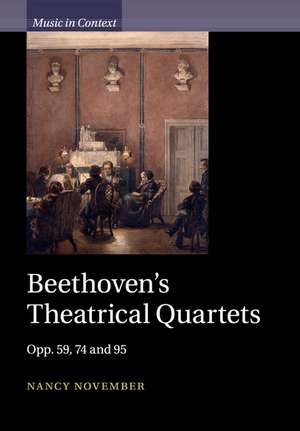Beethoven's Theatrical Quartets: Opp. 59, 74 and 95: Music in Context
Autor Nancy Novemberen Limba Engleză Paperback – feb 2017
| Toate formatele și edițiile | Preț | Express |
|---|---|---|
| Paperback (1) | 288.80 lei 6-8 săpt. | |
| Cambridge University Press – feb 2017 | 288.80 lei 6-8 săpt. | |
| Hardback (1) | 703.64 lei 6-8 săpt. | |
| Cambridge University Press – 8 ian 2014 | 703.64 lei 6-8 săpt. |
Din seria Music in Context
-
 Preț: 225.79 lei
Preț: 225.79 lei - 9%
 Preț: 593.58 lei
Preț: 593.58 lei -
 Preț: 289.01 lei
Preț: 289.01 lei -
 Preț: 225.79 lei
Preț: 225.79 lei -
 Preț: 226.94 lei
Preț: 226.94 lei -
 Preț: 290.38 lei
Preț: 290.38 lei -
 Preț: 242.93 lei
Preț: 242.93 lei -
 Preț: 288.04 lei
Preț: 288.04 lei -
 Preț: 223.85 lei
Preț: 223.85 lei -
 Preț: 289.01 lei
Preț: 289.01 lei -
 Preț: 291.52 lei
Preț: 291.52 lei -
 Preț: 226.94 lei
Preț: 226.94 lei -
 Preț: 228.47 lei
Preț: 228.47 lei -
 Preț: 289.01 lei
Preț: 289.01 lei - 11%
 Preț: 643.37 lei
Preț: 643.37 lei - 9%
 Preț: 594.68 lei
Preț: 594.68 lei - 9%
 Preț: 592.77 lei
Preț: 592.77 lei - 14%
 Preț: 730.39 lei
Preț: 730.39 lei - 11%
 Preț: 644.39 lei
Preț: 644.39 lei
Preț: 288.80 lei
Nou
Puncte Express: 433
Preț estimativ în valută:
55.27€ • 60.01$ • 46.43£
55.27€ • 60.01$ • 46.43£
Carte tipărită la comandă
Livrare economică 22 aprilie-06 mai
Preluare comenzi: 021 569.72.76
Specificații
ISBN-13: 9781316639597
ISBN-10: 1316639592
Pagini: 298
Ilustrații: 9 b/w illus. 1 table 94 music examples
Dimensiuni: 170 x 243 x 16 mm
Greutate: 0.48 kg
Editura: Cambridge University Press
Colecția Cambridge University Press
Seria Music in Context
Locul publicării:Cambridge, United Kingdom
ISBN-10: 1316639592
Pagini: 298
Ilustrații: 9 b/w illus. 1 table 94 music examples
Dimensiuni: 170 x 243 x 16 mm
Greutate: 0.48 kg
Editura: Cambridge University Press
Colecția Cambridge University Press
Seria Music in Context
Locul publicării:Cambridge, United Kingdom
Cuprins
Introduction; 1. Setting the scene: theories, practices, and the early nineteenth-century string quartet; 2. Curtain up: performing the middle-period quartets in Beethoven's time; 3. 'Not generally comprehensible': Op. 59 No. 1 and the drama of becoming; 4. 'With much feeling': song, sensibility, and rhapsody in Op. 59 No. 2; 5. 'Helden-Quartett': genre, innovation, and 'heroic' voices in Op. 59 No. 3; 6. Freudvoll und leidvoll: songful impetus and dualistic voice in the 'Harp' Quartet; 7. 'The quick-witted brevity of the genuine dramatist': Op. 95 and the idea of the fragment; 8. A tale of heroic emancipation? Reception narratives for the middle-period string quartets.
Recenzii
'The book, which considers Beethoven's string quartets of the middle period through numerous lenses, not only fills a previously existing gap in research, but also breaks new ground in terms of presentation and methods: questions of aesthetics, performance practice and analysis are all covered, as well as the reception history and narrative poetics of the string quartets. This bringing together of multiple perspectives leads to significant gains in knowledge.' Bernhard Appel, Director, Beethoven-Archiv and Beethoven-Haus Publishers, Bonn
'Nancy November's study of Beethoven's 'middle' quartets offers many important and original perspectives. Each of the five central chapters is organized around a different general topic, providing welcome breadth to the whole. Her readings of these canonical chamber works in terms of Beethoven's consuming interest in theatrical music will engage both listeners and scholars.' James Webster, Cornell University, New York
'This book catapults the scholarship on the middle-period quartets into the twenty-first century. It is a must-read for Beethoven scholars and should be of significant interest to students of eighteenth- and nineteenth-century music and culture.' Mark Ferraguto, Notes: The Quarterly Journal of the Music Library Association
'Nancy November's study of Beethoven's 'middle' quartets offers many important and original perspectives. Each of the five central chapters is organized around a different general topic, providing welcome breadth to the whole. Her readings of these canonical chamber works in terms of Beethoven's consuming interest in theatrical music will engage both listeners and scholars.' James Webster, Cornell University, New York
'This book catapults the scholarship on the middle-period quartets into the twenty-first century. It is a must-read for Beethoven scholars and should be of significant interest to students of eighteenth- and nineteenth-century music and culture.' Mark Ferraguto, Notes: The Quarterly Journal of the Music Library Association
Notă biografică
Descriere
The first detailed contextual study of Beethoven's middle-period quartets, encompassing reception history, early performance practices, aesthetic contexts and theatrical impetus.
